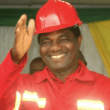Special Assistant to the President for Press and Public Relations Amos Chanda says President Edgar Lungu has left it to mining companies to justify why they are opposing Sales Tax.
Meanwhile, Chanda says President Lungu may not be available for dialogue activities on January 18 due to preset engagements.
Speaking to journalists at State House after President Lungu swore in a new Army Commander, Monday, Chanda disclosed that government had dispatched technocrats to discuss lay-offs at FQM.
“A team of technocrats will actually be traveling to North Western Province to meet with the owners of FQM to look at the numbers that they are proposing, to look at the labour reduction proposals that they are making and to call evidence that shows clearly that they have got a case to make. Otherwise, the summary of it is that the tax measures that the minister announced remain as they are, approved by Parliament and they will take effect as law once the due dates are set, which is tomorrow [January 1] and April 1. So the President has left the matter in the hands of the mining companies to justify for instance, why they are opposed to sales tax here when they are complying with sales tax in other regimes,” Chanda said.
Chanda said President Lungu met mine workers’ unions whilst on the Copperbelt and asked them to lead discussions on the new tax regime.
“President Lungu held two meetings whilst on the Copperbelt. He had a consultative meeting, very fruitful meeting, with the Mine Workers’ Unions, three different unions that represent the mine workers. On Saturday, he held a meeting with representatives of the Chamber of Mines. The discussion centered around the new tax regime that will take effect tomorrow and other measures taking effect on April 1. The President was satisfied with the understanding of the Mine Workers’ Union. They are fully cognizant of the fact that for the government to function smoothly [and] for the social services to be delivered, government has to collect taxes in a free and fair manner. He has encouraged them to engage with the mine owners and seek justification for any decision that the mining companies might decide to make in terms of shedding off labour,” he said.
“He has encouraged the unions to be the team leaders in the discussions to ensure that every action is justified. To call all information and records that must make the case for the mining companies justifiable, if at all it’s justifiable. The summary of that meeting is that the President was satisfied with the knowledge that mine workers unions have over the matter and the engagement. The mine workers unions did make some submissions on behalf of the mine owners that in certain areas government could consider certain changes. But those details cannot be disclosed to the public. The second meeting was with the Chamber of Mines led by the president of the Chamber of Mines. The President made the point very clear that the tax measures and the tax system in Zambia was fair, was not punitive and was arrived at through a broad consultative mechanism. And that government would not put in place any measures that deliberately disadvantaged the growth of the private sector. He made the appeal to them that if they have any genuine cases to present, they must present to the Mines Minister, Minister of Finance, Minister of Labour.”
Meanwhile, Chanda said President Lungu might not be available for dialogue activities on January 18 due to preset engagements.
“As we said, as a standard position, the President was one of the team leaders in pushing for this dialogue so he remains absolutely committed to the dialogue process. And if the dates have been set for 18th and there are any other formalities required, State House requires that those formalities are communicated to State House in due course and with ample time. As you know, the President’s diary sometimes is closed for three months so when we accept anything that comes outside the three months, we are actually bending a lot of regulations, a lot of planning. But the 18th, we have heard from the church mother bodies, the President is available for dialogue. But we emphasize that if there are administrative problems within the facilitating movement, the church and ZCID, those must be sorted out without them being extended to the parties,” said Chanda.
“The President is just one of the parties in there so if the President for instance does not receive formal communication as was the case, do expect him to turn up. In any case, it is a big problem for the presidential secretariat to plan for his attendance when in fact, there is no formal communication. The presidency functions in a manner where all engagements with the President must be formalized. Press statements are different from formal communication. We would encourage the church and ZCID to make every procedure regarding this process formal. Otherwise for any other individual, any other parties their burden of responsibility is lighter than that of the President. If you call them at 10:00 hours, probably they can be there at 11:00 hours. The President does have an idea that there seem to be problems of coordination within the facilitators. That problem must quickly be dealt with so that it doesn’t rub off on the parties.”












